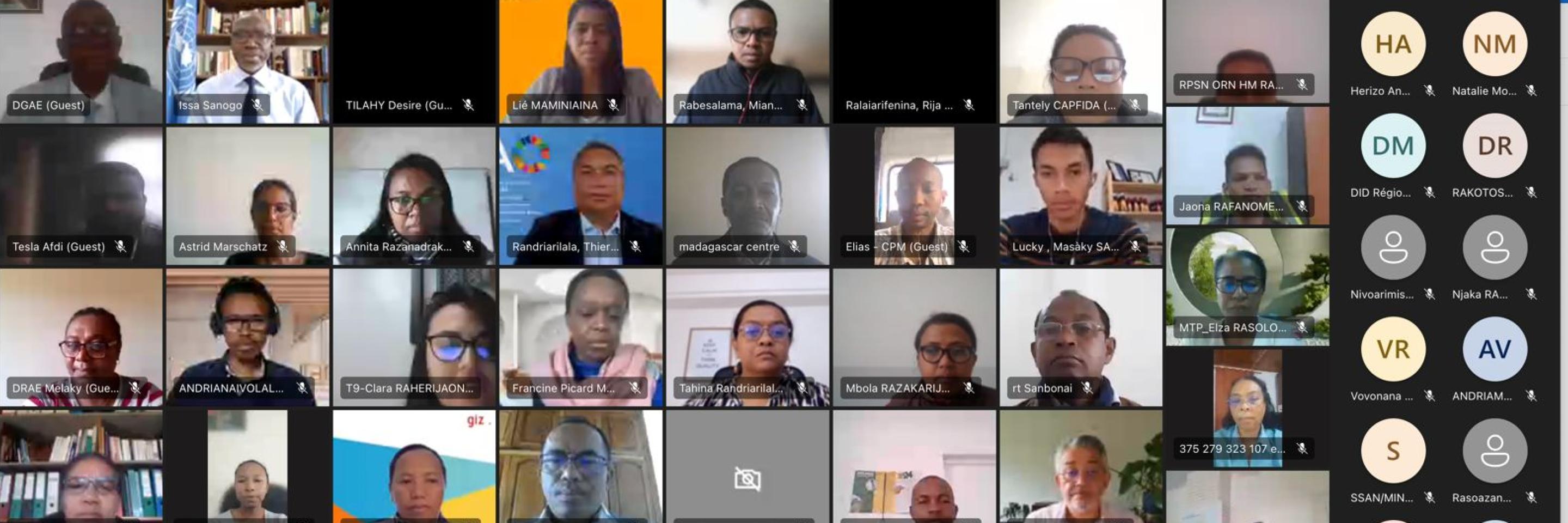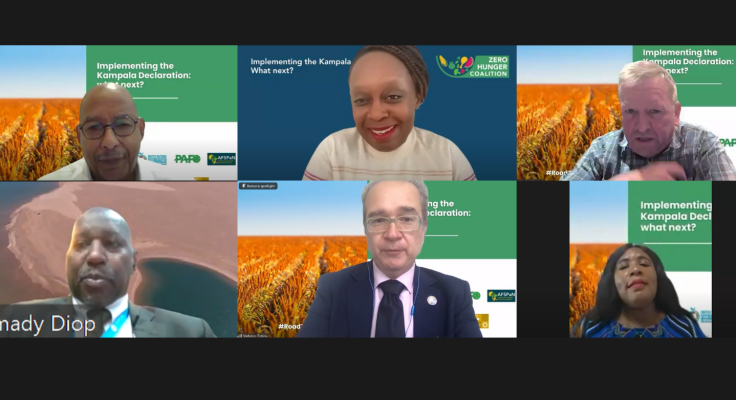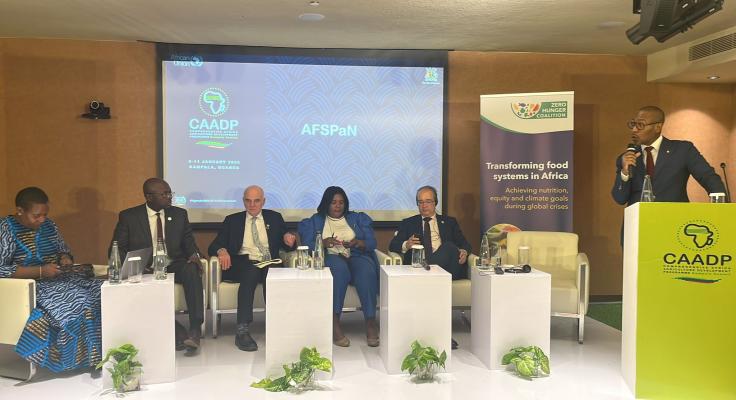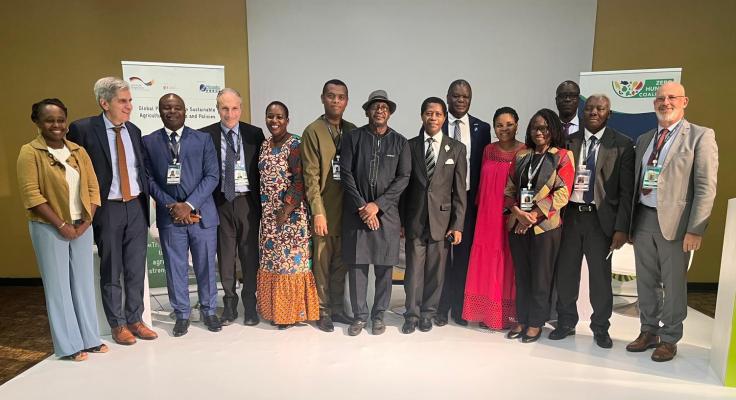
Pathways for food systems transformation in Madagascar
The Ministry of Agriculture and Livestock (MINEA) in Madagascar brought together nearly 100 stakeholders to discuss the initial steps for the development of an action plan towards the operationalization of its National Food System Pathway document. This consultation highlighted the government’s commitment to fostering an inclusive and coordinated approach for realizing the transformation of its food system.
As part of the workshop, three representatives from the Zero Hunger Coalition provided the findings from the Evidence-based and Costed Roadmap. They outlined specific measures to integrate into the action plan and showcased how these efforts aim to significantly advance the transformation of the food system in the country.
Situation in Madagascar
Madagascar currently faces multiple challenges that have dramatically worsened in the past decade, due to rising food and oil prices caused by economic shocks and droughts. As the UN representative in Madagascar, Issa Sanogo, reminded participants during the workshop, 1 million people are affected by acute food insecurity and 500,000 children suffer from severe malnutrition.
In the past decade, hunger has doubled while poverty has remained consistently high with nearly 80 percent of the population living below the extreme poverty line. In addition, an estimated 98 percent of the population cannot afford a healthy diet.
According to Mr Sanogo, food systems transformation offers an opportunity to simultaneously address poverty, hunger and climate change. The United Nations has indicated its strong support for the development of the National Pathway for Food System Transformation in Madagascar which can serve as an important accelerator towards achieving SDG 2 (Zero hunger).
Understanding the National Pathway
The National Pathway for Food System Transformation in Madagascar aims to achieve an efficient, inclusive, resilient, and sustainable food system that can nourish a healthy population. It was developed by the government in April 2022.
Aligned with the UN SDGs as well as existing national policies, it identifies three key axes for further development:
Axis 1 - Promote access to diversified, healthy and nutritious food.
Axis 2 - Promote governance that promotes equitable and resilient livelihoods.
Axis 3 - Promote resilient production in the face of climate change.
According to Michel Anondraka, the Director General at MINEA, food system transformation involves multiple stakeholders and sectors. For him, coordination between the different sectors and actors remains essential. Recognizing the many challenges involved in implementing the National Pathway, he called on the government, civil society, partners and the private sector to clarify their roles and responsibilities to ensure success.
Initial findings from the Zero Hunger Coalition
During the opening session to the workshop, representatives from the Zero Hunger Coalition presented the initial findings from its Evidence-based and Costed Roadmap for Madagascar. The roadmap identifies the most effective and cost-efficient solutions that can achieve multiple outcomes: hunger eradication, healthy diets for at least 60% of the population, and increased income for small producers within the climate goals defined by the Paris Agreement. It has been prepared by the FAO, IFPRI and the Shamba Centre for Food & Climate.
According to the findings in the roadmap, Madagascar suffers from a weak agricultural productivity and a lack of diversity in its crop production. Agriculture remains the leading emitter of greenhouse gases, accounting for 57.3% of emissions, followed by deforestation and land use changes, accounting for 23.8% of emissions.
The Zero Hunger Coalition roadmap also found that the amount of donor funding (ODA) has increased in Madagascar in recent years. Comparing ODA funding between 2018-2019 and 2020-2021, funding has increased by nearly 30 percent. However, this funding has primarily been allocated to social protection programmes for the most vulnerable and emergency assistance rather than the achievement of long-term development goals.
The Zero Hunger Coalition roadmap recommendations focus on how best to operationalize the country’s National Pathways for Food System Transformation. It highlights evidence-based elements that were not initially reflected in the National Pathway, thus advocating for targeted actions. This includes:
Expanding sustainable aquaculture to enhance both the production and the nutrition outcomes;
Improving digital connectivity in rural area to enable access to digital services such as meteorological information;
Introducing innovative financial mechanisms such as seasonal loans, agricultural insurance;
Developing renewable energy sources for cooking and heating;
Improving weather forecasts and early warning alert systems

The roadmap further recommends strengthening infrastructure to help reduce post-harvest losses and improve market access, focusing on education and dietary guidelines to improve nutrition, and strengthening the role and autonomy of women.
However, as noted by the Zero Hunger Coalition, the situation in Madagascar calls for the continued prioritizing of social protection and emergency food aid. These actions should be complemented with interventions focused on environmental protection that can also increase agricultural productivity and facilitate market access for agricultural products, especially through strengthening infrastructure. Some actions, such as social protection services carry high costs while others, such as investments in infrastructure incur high initial costs but offer longer term benefits. Trade-offs and political leadership will be needed.
The Zero Hunger Coalition will publish its final Roadmap in early May.



